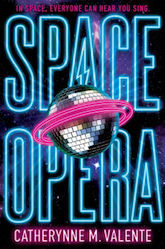With the delightfully garish neon tagline “In space, everyone can hear you sing” emblazoned across its cover, Catherynne M. Valente’s newest novel Space Opera is a marked shift from the seriousness of Deathless (2011) or Palimpsest (2009). It is, in fact, nothing less than intergalactic Eurovision in the fine stylistic tradition of Douglas Adams—madcap, bizarre, comedic, and shot through with a certain wholesome kindness.
After the near-fatal cosmic consequences of the Sentience Wars, the universe at large decides who gets a seat at the table of sentient species—and where the resources get distributed—via a pop music competition. If a petitioning new species comes in dead last, their artifacts and culture will be recorded and they will be summarily scrubbed from existence to let the next smart bit of flora or fauna on their planet have a chance in a few million years. When the Esca, a birdlike alien race, appear to every human on Earth one afternoon to inform them of their responsibility to participate in the coming Grand Prix, it’s our turn to choose how to portray our species.
Buy the Book


Space Opera
And so humanity will be represented by two washed-up rockstars: Decibel Jones and Oort St. Ultraviolet, formerly of Decibel Jones and the Absolute Zeros.
A clever, thorough mashup of David Bowie, Eurovision, Douglas Adams, and Valente’s ever-astounding prose drives Space Opera. All of its heart and heft comes from the honest, devoted adoration that rolls off the page at every turn; it’s hard to miss Valente’s total love for her subject and for the argument she’s seeking to make about the production of culture, the songs we sing when the lights go out and we’re left cold in the night. This book is eminently contemporary, enmeshed in arguments about politics, nationalism, resources, and xenophobia.
The fun part, of course, is that it tackles these grim realities with a manic, enthusiastic drive to create light in the dark. This light comes in the form of pop music created by species including a parasitic zombie virus, giant aquatic tube creatures, animate Easter Island heads, a mind-bogglingly complex AI, and so forth. Our musicians Dess and Oort, reunited with years of trauma between them to sort through, are paradoxically the best choice for the human species: queer and strange and full of regrets, full of love, full of mistakes, full of desire. The central loss that haunts them both is that of Mira Wonderful Star, their third bandmate and lover—and the blame they each place about her untimely death.
Valente spends the majority of the novel on asides, species observations, and narratorial conspiracies to teach the audience a bit of something about the Sentience Wars, the Grand Prix itself, and the nature of thoughtful life in the universe. For all of its humor and bounce, Space Opera is a chaotically philosophical text full of questions, eager to provoke the reader into considering difficulties of race, gender, economics, and whether or not our species really is worth keeping around after all.
Mild spoilers below.
Given the horrible things we’ve done. Given our failures. As the text posits, does the existence of Mr. Rogers balance a scale that also includes genocide? Dess and Oort are unsure themselves of their mission, their ability to pull it off, and what it will mean if they do. Once they arrive at the semi-final round of the Grand Prix, a mixer of sorts, both are tempted with something that would seem to be a perfect opportunity to sell out their species—and neither takes it. This passes them into the competition itself. (The talking cat, however, fails abysmally; this is one of Valente’s most amusing asides.)
Technically speaking, the narrative takes place over barely a few days: aliens appear on earth to inform us of our situation, our musicians are spirited away with the Esca whom Dess forms an intimate relationship with, and they travel to the Grand Prix to perform. The work of the text is done primarily via interpersonal interactions, stories about past events, and Valente’s delightful, cacophonous, hilarious worldbuilding project. What’s space Eurovision without backstory, after all? And the backstory is a wonder, each chapter a fresh bit of fun with a sharp bite of argument underneath. Adams himself would’ve been proud, I suspect. It’s a mighty tribute to his tradition.
And in the timeline we find ourselves living, Space Opera is a breath of fresh air. It does not take itself seriously; paradoxically, this makes it terribly serious. After all, as the narrator argues, sentience doesn’t rest in the ability to speak or build cities or love our children or pass down knowledge—animals can all do that to varying degrees. Sentience is marked instead in the ability to throw on a glam costume and belt out a driving, emotional, exciting anthem that speaks across audiences. In short: the ability to make popular music.
Dess and Oort are solid protagonists, both of whom have dealt with their pasts and presents in opposite ways. Dess became larger than life; Oort tried to become Englishblokeman. Both are English by way of another place, India or Pakistan, and both have dealt with confusion over their sexuality. The contrast between them externally and internally is one of the most moving and quiet elements of the novel—neither is right or wrong in their assumptions and habits, or at least not wrong all the time. Or right all the time. They’re simply human.
It’s a big, loud, spangly novel, but it’s also a personally intimate one. Valente has done a fine job giving us the glitz, the glam, and the heart all at once. These are the elements that drive a contest like Eurovision and, made larger than life on the vast landscape of the universe, those elements can be made even more obvious. Plus, it’s just really fun, and really silly, and really wholesome in the end. There’s a contest, there’s sex between species who have some curious questions about what goes where when, there’s a birth, there are deaths—and there’s hope.
That’s the best part.
Space Opera is available from Saga Press.
Lee Mandelo is a writer, critic, and editor whose primary fields of interest are speculative fiction and queer literature, especially when the two coincide. They have two books out, Beyond Binary: Genderqueer and Sexually Fluid Speculative Fiction and We Wuz Pushed: On Joanna Russ and Radical Truth-telling, and in the past have edited for publications like Strange Horizons Magazine. Other work has been featured in magazines such as Stone Telling, Clarkesworld, Apex, and Ideomancer.










